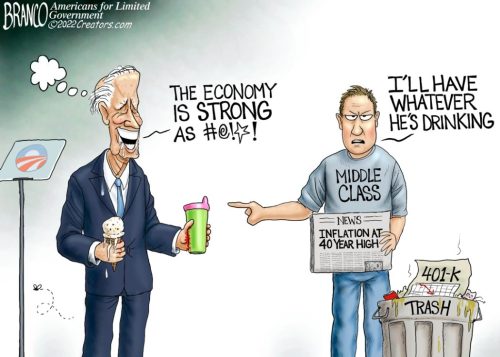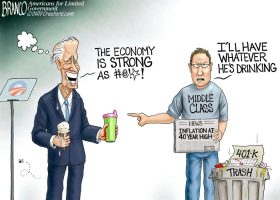
President Joe Biden has gotten into a revisionist history habit.
He has repeatedly claimed that he inherited an economic disaster. It was his policies, he alleges, which brought us back from the brink—and Biden is likely to repeat that narrative in his State of the Union address on Tuesday night.
The only problem with Biden’s version of events is the facts.
For starters, Biden has frequently said that inflation was out of control when he became president, going so far as to say it was one of the reasons he ran for office. But inflation averaged less than 2% during the primary campaign and averaged closer to 1% during the general election campaign. When Biden took office, annual inflation was a mere 1.4%.
Fast-forward a year and a half, and inflation was 1.3%—for a single month.
Prices were rising about as fast in one month as they did in the entire year before Biden took office. The annual inflation rate broke 9% for the first time in four decades.
The president’s retelling of events is also incongruous with his own previous statements on inflation. He used to say that inflation was merely transitory. Why, then, would he decide to run for president on a transitory issue? And why would he now take credit for reducing inflation if it was only transitory to begin with?
That reduction in inflation has been little consolation for the average American family, buckling under the weight of rising prices, particularly for necessities such as food and shelter. While the rate of price increases has certainly slowed in recent months, as government deficit spending also slowed and the Federal Reserve hiked interest rates, prices are still up about 14% under Biden.
That is substantially more than the increase in average earnings.
Adjusting those earnings for inflation, called real earnings, shows that people can buy less today than when Biden took office. The average family has seen real annual earnings fall about $6,000 under Biden, while higher interest rates have increased borrowing costs another $1,400. That means a family effectively can buy $7,400 less today than it could in January 2021.
While real earnings have improved slightly over the past several months, they are still below their May 2022 level, and down 5.5% under Biden. Simultaneously, the monthly mortgage payment on a median-priced home has risen 80%, or about $9,500 a year. The president is fond of saying his administration is providing families with “breathing room,” but it looks like that breathing room is underwater.
And Biden’s distortion of the facts continues with the labor market. He is quick to brag about a record number of jobs being added in his first two years of office, and he is technically correct about non-farm payrolls increasing dramatically, but this is cherry-picking in the extreme, not to mention taking the data out of context.
The economy lost 20.5 million jobs in March 2020, an unprecedented decline. But the recovery was also unprecedented, as businesses reopened, and lost jobs were restored. Recovering lost jobs is hardly the same, however, as job “creation,” a word that the president uses frequently.
Yet, even if Biden wants to play that game, he still doesn’t win. Using Biden’s own logic, President Donald Trump added 12.5 million jobs in nine months, averaging 1.4 million jobs per month. Biden has added 12.1 million jobs in two years, averaging 500,000 jobs per month.
Did Trump “create” more jobs in less time than Biden? According to Biden’s logic, yes. But the entire discussion of merely regaining lost jobs after the government-imposed shutdowns is meaningless.
When the initial lockdowns ended in late spring 2020, many people immediately returned to work. Although Biden loves to tout manufacturing jobs numbers, he ignores the fact that 41% of those jobs lost in the initial outbreak of COVID-19 were recouped by June 2020.
The recovery that began two years ago was unprecedentedly large because the decline before it was equally large. What Biden inherited was an economy growing at a $1.5 trillion annualized rate—hardly “reeling,” as he now describes it. And yet, the economy managed two consecutive quarters of negative economic growth a year and a half after Biden took office, with many economists forecasting negative growth to return this year.
These may be politically inconvenient facts, but they’re facts, nonetheless.
Before trying to misrepresent them in his State of the Union address, Biden should consider the words of Winston Churchill: “United wishes and good will cannot overcome brute facts. Truth is incontrovertible. Panic may resent it. Ignorance may deride it. Malice may distort it. But there it is.”
This article first appeared at FoxBusiness.com. Reproduced with permission. Original here.
EJ Antoni is a research fellow for regional economics in the Center for Data Analysis at The Heritage Foundation.

